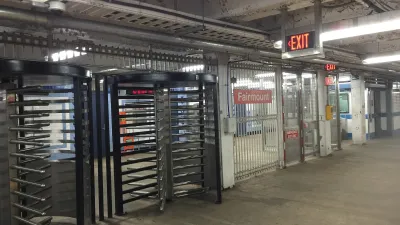Within the last six months, two forward thinking American cities have created new positions for Chief Innovation Officers, with a mission to connect city hall with a new generation of problem-solvers outside of it, reports Emily Badger.
As distrust in the effectiveness of those working to improve cities from within the walls of city hall grows, a concurrent rise in interest among those outside city hall to work with, or around, government to achieve change in their communities is developing along with it, explains Badger. In recognition of this interest, and the opportunity to do more with less, cities are creating new Chief Innovation Officer (CIO) positions to engage and harness such potential resources.
Badger speaks with Jay Nath, the CIO for the city of San Francisco, and Adel Ebeid, CIO for Philadelphia, about their roles in working with, "the so-called civic hacker, a growing army of deeply committed, tech-savvy city-dwellers who don't necessarily want to work for government, but who wouldn't mind spending a Saturday afternoon benevolently coding its data."
Badger connects the beginning of the governmental open-data trend to the appointment of Vivek Kundra by Barack Obama as the country's first official chief information officer in 2009. As information has moved to the cloud, that has freed up information officers to focus more on innovation and less on infrastructure.
Among the biggest barriers to maximizing the potential of those working outside government comes from the attitudes and decades-old processes of those within. According to Badger, "People on the outside of government are much more comfortable with the idea of collaborative problem-solving. 'On the inside, it's a different story,' echoes Ebeid. 'On the inside, you're dealing with assembly-line processes that were developed in the ‘70s and ‘80s, a culture of ‘I've just got to get widgets out,' rather than, what's the value of what I'm doing?'"
FULL STORY: The Dawn of the Municipal Chief Innovation Officer

Planetizen Federal Action Tracker
A weekly monitor of how Trump’s orders and actions are impacting planners and planning in America.

Restaurant Patios Were a Pandemic Win — Why Were They so Hard to Keep?
Social distancing requirements and changes in travel patterns prompted cities to pilot new uses for street and sidewalk space. Then it got complicated.

Maui's Vacation Rental Debate Turns Ugly
Verbal attacks, misinformation campaigns and fistfights plague a high-stakes debate to convert thousands of vacation rentals into long-term housing.

Boulder Eliminates Parking Minimums Citywide
Officials estimate the cost of building a single underground parking space at up to $100,000.

Orange County, Florida Adopts Largest US “Sprawl Repair” Code
The ‘Orange Code’ seeks to rectify decades of sprawl-inducing, car-oriented development.

Maui's Vacation Rental Debate Turns Ugly
Verbal attacks, misinformation campaigns and fistfights plague a high-stakes debate to convert thousands of vacation rentals into long-term housing.
Urban Design for Planners 1: Software Tools
This six-course series explores essential urban design concepts using open source software and equips planners with the tools they need to participate fully in the urban design process.
Planning for Universal Design
Learn the tools for implementing Universal Design in planning regulations.
Heyer Gruel & Associates PA
JM Goldson LLC
Custer County Colorado
City of Camden Redevelopment Agency
City of Astoria
Transportation Research & Education Center (TREC) at Portland State University
Camden Redevelopment Agency
City of Claremont
Municipality of Princeton (NJ)





























